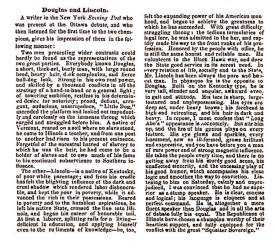Record Data
Transcription
A writer in the New York Evening Post who was present at the Ottawa debate, and who then listened for the first time to the two champions, gives his impression of them in the following manner:
Two men presenting wider contrasts could hardly be found as the representatives of the two great parties. Everybody knows Douglas, a short, thick-set, burly man, with large round head, heavy hair, dark complexion, and fierce bull-dog look. Strong in his own real power, and skilled by a thousand conflicts in all the strategy of a hand-to-hand or a general tight; of towering ambition, restless in his determined desire for notoriety; proud, defiant, arrogant, audacious, unscrupulous, “Little Dog,” ascended the platform and looked out impudently and carelessly on the immense throng which surged and struggled before him. A native of Vermont, reared on a soil where no slave stood, he came to Illinois a teacher, and from one post to another had risen to his present eminence. Forgetful of the ancestral hatred of slavery to which he was the heir, he had come to be a holder of slaves and to owe much of his fame to his continued subservience to Southern influence.
The other – Lincoln – is a native of Kentucky, of poor white parentage; and from his cradle has felt the blighted influence of the dark and cruel shadow which rendered labor dishonorable, and kept the poor in poverty, while it advanced the rich in their possessions. Reared in poverty and to the humblest aspirations, he left his native State, crossed the line into Illinois, and began his career of honorable toil. At first a laborer, splitting rails for a living – deficient in education, and applying himself even to the rudiments of knowledge – he, too, felt the expanding power of his American man hood, and began to achieve the greatness to which he has succeeded. With great difficulty struggling through the tedious formularies of legal lore, he was admitted to the bar, and rapidly made his way to the front ranks of his profession. Honored by the people with office, he is still the same honest and reliable man. He volunteers in the Black Hawk war, and does the State good service in its sorest need. In every relation of life, socially and to the State, Mr. Lincoln has been always the pure and honest man. In physique he is the opposite of Douglas. Built on the Kentucky type, he is very tall, slender and angular, awkward even, in gait and attitude. His face is sharp, large-featured and unprepossessing. His eyes are deep set, under heavy brows; his forehead is high and retreating, and his hair is dark and heavy. In repose, I must confess that “Long Abe’s” appearance is not comely. But stir him up, and the fire of his genius plays on every feature. His eye glows and sparkles, every lineament, now so ill-formed, grows brilliant and expressive, and you have before you a man of rare power and of strong magnetic influence. He takes the people every time, and there is no getting away from his sturdy good sense, his unaffected sincerity, and the unceasing play of his good humor, which accompanies his close logic and smoothes the way to conviction. Listening to him on Saturday, calmly and unprejudiced, I was convinced that he had no superior as a stump speaker. He is clear, concise and logical; his language is eloquent and at perfect command. He is, altogether a more fluent speaker than Douglas and in all the arts of debate fully his equal. The Republicans of Illinois have chosen a champion worthy of their heartiest support, and fully equipped for the conflict with the great “Squatter Sovereign.”




